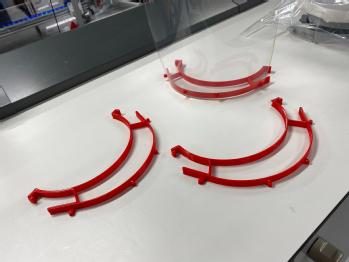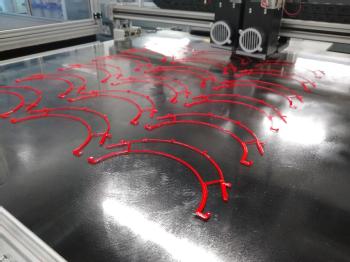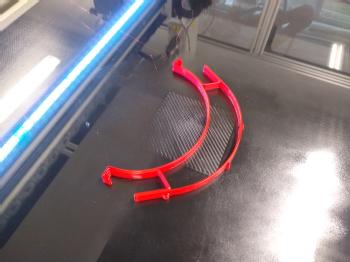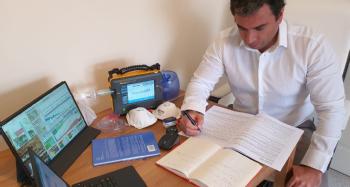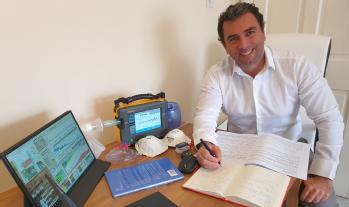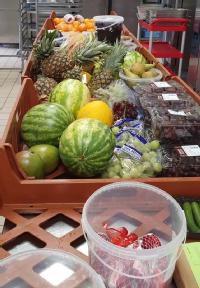Ventilators, visors, volunteers and testing - more than a dozen more ways Warwick staff & students are helping respond to the pandemic
Thirteen ways our community is helping others
“Last week I was able to tell you about five ways our staff and students are actively assisting in the response to the pandemic. I promised to come back to you soon to tell you about even more about the work of many more of our dedicated staff and students I these challenging times and today I am keeping that promise.
Here are over twice as many more ways in which our students and staff are helping from ventilators, visors, and volunteering to helping produce more COVID-19 testing ,and providing online computing experiments for primary school children now learning at home.
In many cases we can’t name the individuals as we want to leave them in peace to get on with their work but where we can they are named below.
Once again I want to give my personal thanks to each and every one of them – they are all inspiring people that are helping us all in these difficult times.”
Professor Stuart Croft
Vice-Chancellor of the University of Warwick
- WMG researchers are helping a consortium of scientists and companies to develop an alternative model of ventilator
- Warwick Medical School researchers are making more reagents for COVID-19 testing
- Engineers are 3D printing hundreds of PPE face shields for use in the NHS
- WMG researchers are creating fun computer experiments for children stuck at home
- Medical students are volunteering in local hospitals
- Engineering researchers are helping the World Health Organisation to safely manufacture PPE and medical devices to combat COVID-19
- Warwick Conferences are welcoming NHS staff
- Warwick Conferences are donating food and toiletries
- Physics researcher is showing everyone how to make full face visors out of plastic drinks bottles
- Our labs are giving our Personal Protective Equipment (PPE) to Warwickshire NHS
- Our Security team is offering free tea and coffee to any emergency services passing by
- Warwick Sport are providing live streamed virtual fitness classes
- Our staff and students are volunteering across the country
1) WMG researchers are helping a consortium of scientists and companies to develop an alternative model of ventilator
WMG at the University of Warwick is helping a body of British citizen scientists, medical clinicians, academics, manufacturers and engineers who have developed an alternative model of ventilator to support the Government’s drive to equip the NHS (pictured right).
The new model, the exovent, is a cutting-edge reinvention of the archetypal iron lung which saved the lives of countless polio victims during the last century.
University and industry working together
Marshall Aerospace & Defence Group, the UK’s leading privately owned Aerospace and Defence business, is exploring the technical aspects of the scheme ahead of rapid production and roll-out of the Negative Pressure Ventilator (NPV).
The exovent concept is also supported by WMG at the University of Warwick and representatives from Imperial NHS Trust and The Royal National Throat Nose and Ear hospital. Two leading intensive care units have agreed to trial the prototype ventilator support devices.
A non-invasive solution
exovent is non-invasive, which means that patients do not need to have their windpipes intubated, so they don’t need to be sedated or paralysed. Instead, they can remain conscious, take medication and nutrition by mouth, and talk to loved ones on the phone. It can be used on a normal ward, keeping patients out of intensive care
Margot James, Executive Chair of WMG at the University of Warwick commented:
“We are delighted to be working with exovent to help scale up their non-invasive ventilator from prototype to volume manufacturing. Our engineers and researchers are collaborating with the exovent team on the design, engineering, component sourcing and assembly of the ventilator. I am extremely proud of the unstinting and dedicated efforts of our research team, led by Archie MacPherson at WMG, and glad that we are able to apply our expertise to this important project.”
2) Warwick Medical School researchers are making more reagents for COVID-19 testing
Two Warwick Medical School researchers are using supplies from a campus laboratory to make more of the reagents required for Covid-19 testing which have facing been facing some supply challenges.
They will supply those reagents to UHCW’s Coventry Hospital site for testing on patients.
3) Engineers are 3D printing hundreds of PPE face shields for use in the NHS
Dr Simon Leigh from the University of Warwick’s School of Engineering is working with Warwick PhD researcher Elizabeth Bishop to 3D print hundreds of PPE face shields for the NHS using the 3D printing facilities in the University’s Engineering laboratories.
They are mostly using a new face shield design by devised by Elizabeth that can be printed in just 6 minutes using the technique she has devised in her own PhD research.
Most other 3D printable shield designs take an hour or more to 3D print.
Simon, Elizabeth and other members of their team are also looking at using 3D printers that can make these even faster that was actually developed by a group of 4th year Warwick Engineering students.
4) WMG researchers are creating fun computer experiments for children stuck at home
Now that schools across the UK are closed to many pupils due to COVID-19, the challenge is on for parents to keep their children educated. Or failing that – just keep them occupied.The outreach team from WMG at the University of Warwick, want to encourage children and their parents and carers to use this time to explore some of the fun, creative STEM learning opportunities which are available online. With support from the HVM Catapult, the outreach team at WMG has produced a number of online activities for children of all ages to get involved and learn something new.
Dr Phil Jemmett, a Project Officer from WMG,at University of Warwick comments:
“Every product in your house has been made by engineers and shaped by scientists. We want to tell the story behind those items and show you experiments that you can do with everyday stuff. Now that we are all staying in our homes, we just have to find a way to do STEM with what we’ve got!”
5) Medical students are volunteering in local hospitals
The 120 final year students from Warwick Medical School at The University of Warwick will initially be employed by the NHS locally supporting health services across Coventry and Warwickshire to help deliver vital support to existing medical and other clinical staff to help in the response to Coronavirus COVID-19.
The students, who have volunteered to work in local health services, will be undertaking duties such as clerking patients, administrative tasks to support clinical teams and operating a doctor ‘buddy’ system.
Sixty students will be working at University Hospitals Coventry and Warwickshire and 30 each at Warwick Hospital and George Eliot Hospital in Nuneaton.
Find out more about their volunteering efforts
6) Engineering researchers are helping the World Health Organisation to safely manufacture PPE and medical devices to combat COVID-19
Dr Leandro Pecchia is a Reader in Engineering, in the University of Warwick’s School of Engineering.
He is helping the World Health Organisation as they set minimum requirements for essential medical devices used to diagnose and treat COVID patients, and also the Personal Protective Equipment (PPE) employed to protect NHS nurses and doctors.
With Davide Piaggio, a PhD research student in his lab, he is also supporting manufacturers in UK and in Italy, where four companies have already converted their productions to start manufacturing PPE (including masks, face shields) and medical devices (ventilators, monitors).
In particular Dr Pecchia team is offering support and guidance concerning the quality testing and navigating the regulatory framework, which in this crisis is even more challenging.
Dr Leandro Pecchia is Secretary General of the global scientific society for biomedical engineering and medical physics (IUPESM).7) Warwick Conferences are welcoming NHS staff
Warwick Conferences, who are part of the University of Warwick, are accommodating NHS staff, and Warwick Medical students helping in local hospitals, supplying them with bed and breakfast in their conference bedrooms to help them stay working at the
frontline in the fight against the pandemic.
8) Warwick Conferences are donating food and toiletries
Warwick Conferences have also donated a significant amount of fresh food to Emmaus (a charity that supports the homeless people get back on their feet), and are also working with them to supply soup.
They have also donated 12 catering boxes of food to Coventry Food Bank, and around 150 toiletry items to the YMCA including shower gels, shampoo, and body wash.
9) Physics researcher is showing everyone how to make full face visors out of plastic drinks bottles
For isolated situations around the world where and when no other visors are available, Dr Matthew Broome from the University of Warwick’s Department of Physics has put together a video on making a homemade full face visor from a plastic bottle.
Watch Matthew's instructional video on YouTube
10) Our labs are giving our Personal Protective Equipment (PPE) to Warwickshire NHS
As reported in our previous press release, many of Warwick’s research labs have suspended activity to support the Government’s instruction for all but critical workers to stay at home.
However, those labs held significant supplies of Personal Protective Equipment (PPE) that would be better employed in the NHS rather than stored in those labs and we had therefore donated significant amounts of spare PPE to UHCW’s Hospital site in Coventry.
In addition to that we have also now given more such supplies to the South Warwickshire NHS Foundation Trust. WMG (Warwick Manufacturing Group) has also donated its surplus PPE stocks to local hospitals
11) Our Security team is offering free tea and coffee to any emergency services passing by
Some key staff are required to remain on campus for health and safety try reasons and one such group is the University Security Team.
They are offering a free cup of tea/coffee to all emergency service personnel who pass through campus and put out this note to their emergency service partners:
“To our friends in the emergency services, if you’re in the area or passing through please feel free to drop into Campus Security for a free cup of tea/coffee. Our way of saying thank you and we are open 24/7”
12) Warwick Sport are providing live streamed virtual fitness classes
Over the coming weeks Warwick Sport at the University of Warwick will be bringing people daily workouts, advice and activities for you and all of the family, delivered by our expert team.
- See the timetable of the virtual classes
- Watch their live streams on their Facebook page
- Explore other online fitness resources
13) Our staff and students are volunteering across the country.
Many of our staff and students are volunteering in all sorts of ways - from a member of the University’s Marketing team using her previous primary school teacher skills to read online stories to children stuck at home, to a team of students team who have organised a Facebook group to help carry out babysitting and shopping for NHS staff.
Two Warwick researchers in the University’s School of Life Sciences – a virologist and epidemiologist - have helped those students them put together an Infection Prevention Protocol to ensure students who are volunteering are keeping safe.
- NB the above story (13) has already been reported here: https://www.coventrytelegraph.net/news/coventry-news/medical-students-offer-carry-out-17996160
For further information please contact:
Tom Frew, Senior Press and Media Relations Manager
University of Warwick:
Email: a.t.frew@warwick.ac.uk
Mobile: +44(0)7785433155
Or
Peter Dunn, Director of Press and Media Relations, University of Warwick,
Tel UK: 024 76523708 office 07767 655860 mobile
Tel from overseas: +44 (0)24 76523708 office +44 (0)7767 655860 mobile/cell
Email: p.j.dunn@warwick.ac.uk




